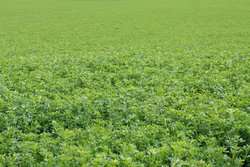New variety already grown in a few provinces
By Diego Flammini
Assistant Editor, North American Content
Farms.com
A scientist with Agriculture and Agri-Food Canada says a new variety of alfalfa developed in the Maritimes could help producers grow more feed for their cattle.
Geneticist Yousef Papadopolous began looking for better alfalfa in 1988. After nearly 30 years of work and 2,000 plants, the variety known as CRS 1001 could be a huge help for farmers.
“I think it has tremendous potential,” he told CBC. “I know it can tolerate our diverse environments across Canada. It’s got an advantage. It will have a market here (the Maritimes) and it will have a market elsewhere.”

It’s developed with rhizomes, which produce creeping root stocks and can improve plant survival in the Maritimes where farmers are impacted by excessive moisture and poor soil quality.
Farms in Saskatchewan, Ontario and Quebec have grown the new variety, and other field tests have been conducted in Nova Scotia and Prince Edward Island.
Beginning in February, seed companies will bid for the right to produce CRS 1001. Papadopolous said the companies should ensure Maritime farmers aren’t left out of the conversation.
“We want to make sure the farmers who have been supporting us have access,” he told CBC. “Those farmers have been helping us in the real world.”